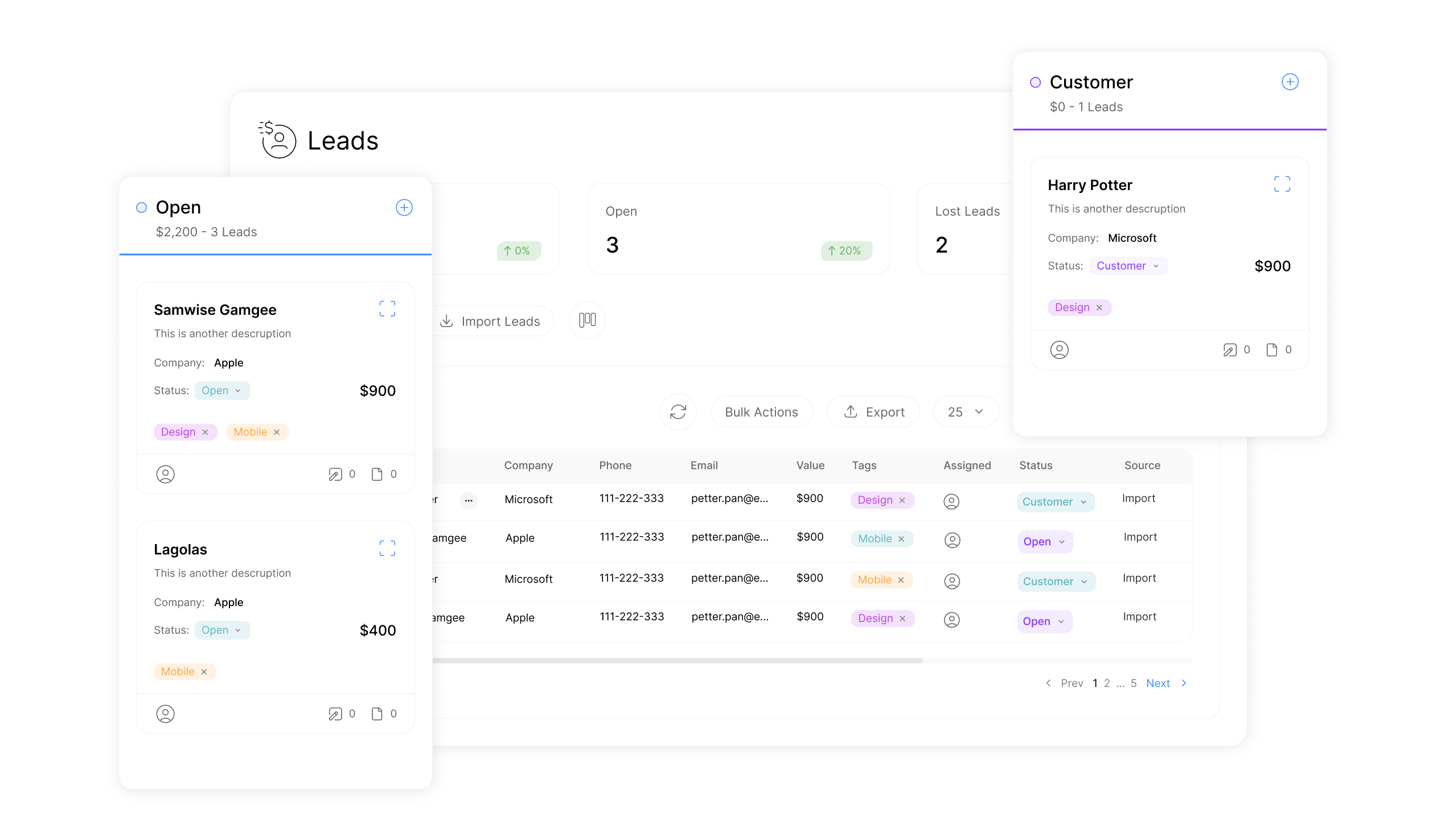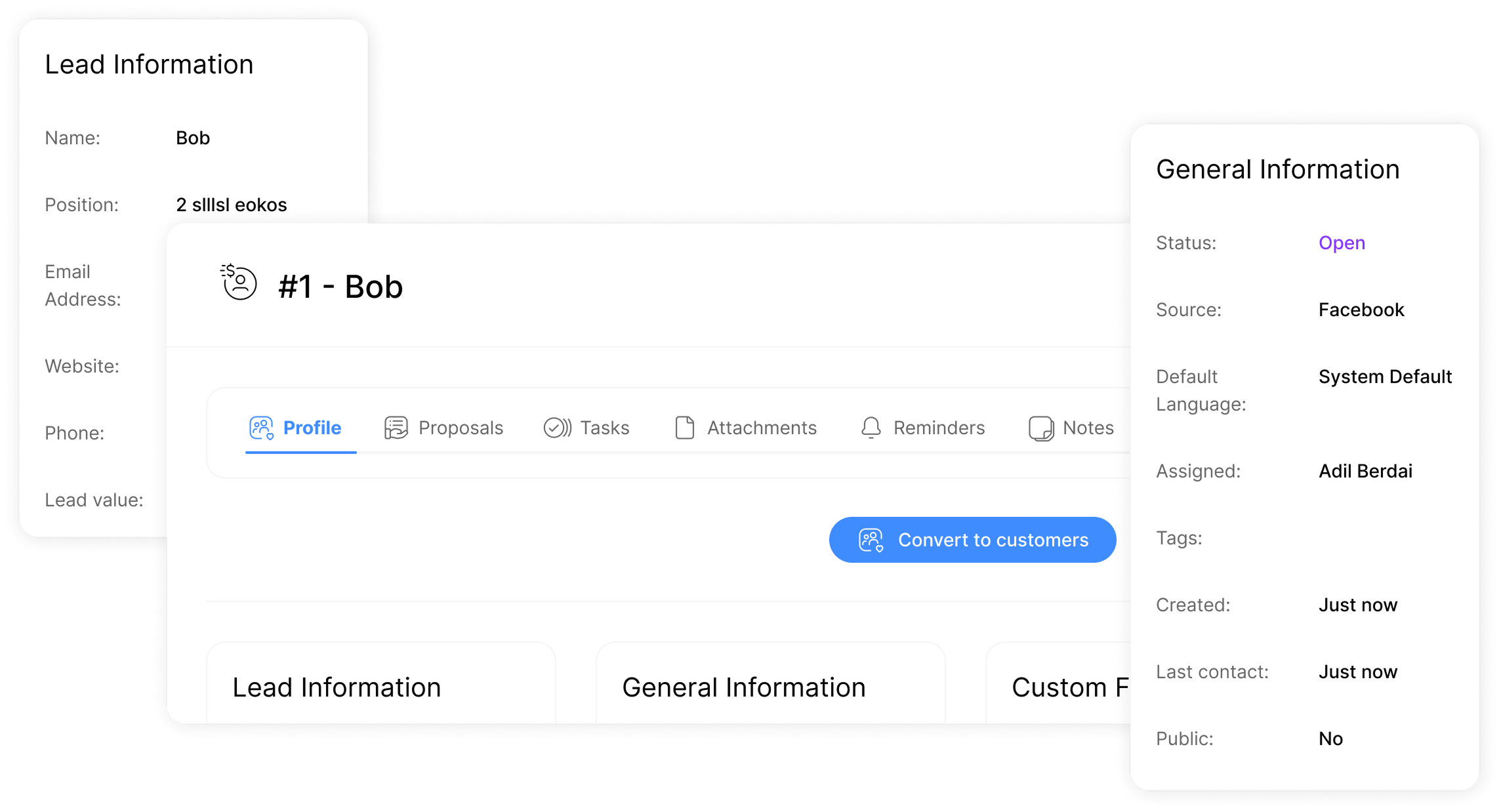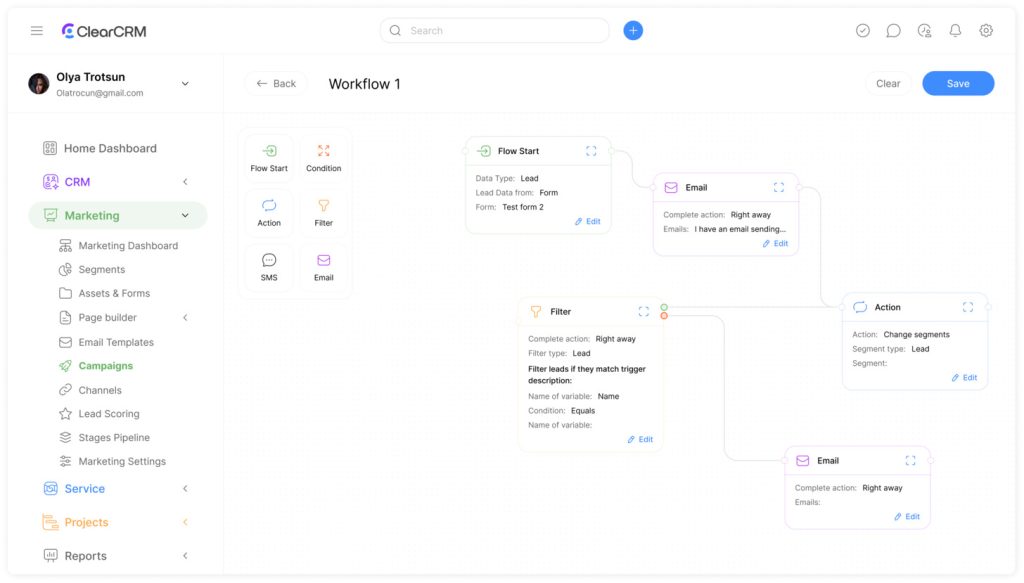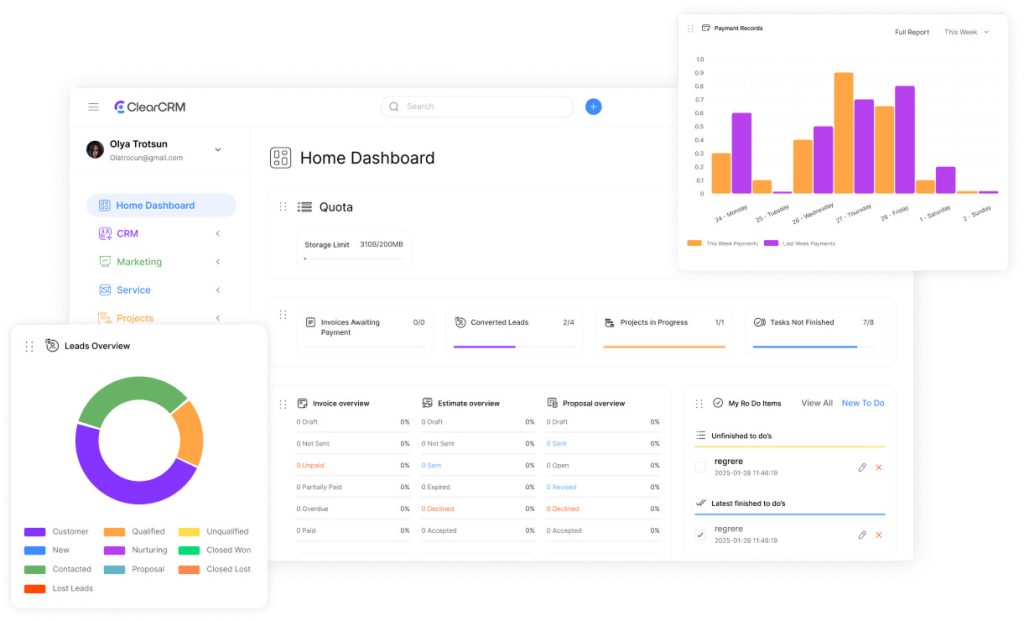Lead Management And Tracking for Business Success


Capture Every Lead, Automatically
Stop missing leads — auto-capture from every channel.
ClearCRM brings all your prospects into one place, ready for action.
- Auto-import from forms, email, and integrations
- Instant lead creation from embedded web forms
- Link leads to deals, tasks, and files seamlessly
Organize, Prioritize, and Take Action
Work smarter with visual pipelines and smart filters.
Quickly sort, assign, and follow up on leads that matter most.
- Switch between Kanban and List views
- Tag, group, and filter leads in seconds
- Set tasks and reminders for every contact


Know What’s Working — and What’s Not
Track lead activity and optimize conversions.
See what’s driving results — and where drop-offs happen.
- Log lost reasons and spot patterns
- View full lead history and touchpoints
- Filter by any field for smart segmentation
Could businesses be leaving revenue on the table due to inefficient lead management?
In today’s competitive market, effective lead tracking is crucial for maximizing conversion rates and driving revenue growth. Companies that implement lead management software often report significant revenue gains — with some small sales teams generating up to $1 million more annually.
By leveraging modern lead management platforms, businesses can automate manual data entry, streamline the sales process, and gain valuable insights to inform their marketing strategies.
Key Takeaways
- Effective lead management is crucial for maximizing conversion rates and driving revenue growth.
- Implementing the right lead management software can significantly increase revenue.
- Modern lead management platforms offer automation capabilities that streamline the sales process.
- Proper lead tracking enables businesses to prioritize follow-ups and manage tasks efficiently.
- Data-driven insights from lead management systems inform marketing strategies and improve team efficiency.
Understanding Lead Management and Tracking

In today’s competitive business landscape, understanding lead management and tracking is vital for driving sales growth and improving marketing ROI. Businesses need to monitor and analyze lead interactions to optimize their sales processes.
What is Lead Management?
Lead management refers to the process of capturing, tracking, and managing leads throughout the sales funnel. It involves using lead management software to streamline this process, ensuring that no potential customer is overlooked. Effective lead management enables businesses to prioritize leads based on their likelihood to convert, thereby enhancing sales team efficiency.
By implementing a robust lead management system, businesses can gain valuable insights into lead behavior, preferences, and pain points. This information can be used to tailor marketing strategies and improve customer engagement.
The Importance of Effective Lead Tracking
Lead tracking is the process of monitoring lead interactions across multiple touchpoints, providing businesses with a comprehensive understanding of the customer journey. The benefits of lead tracking include:
- Identifying the most effective marketing channels and campaigns
- Personalizing follow-up strategies based on lead behavior
- Capturing valuable data to inform future marketing strategies
- Improving conversion rates by addressing bottlenecks in the sales process
By leveraging lead tracking, businesses can make data-driven decisions, optimize their sales processes, and ultimately drive revenue growth.
Key Benefits of Implementing Lead Management Systems

Lead management systems offer a multitude of benefits that can significantly enhance business operations. By streamlining lead tracking and management, businesses can make data-driven decisions, improve sales team efficiency, and increase conversion rates.
Increased Conversion Rates
One of the primary advantages of lead management systems is their ability to help businesses increase conversion rates. By providing a clear overview of the sales pipeline, these systems enable sales teams to focus on high-potential leads and tailor their strategies accordingly. Effective lead tracking allows businesses to identify patterns in successful conversions, informing more effective marketing campaigns.
Improved Sales Team Efficiency
Lead management systems also improve sales team efficiency by automating routine tasks and providing actionable insights. With comprehensive lead data, sales teams can prioritize leads more effectively, reducing the time spent on unqualified leads and enhancing overall productivity. This enables businesses to allocate resources more efficiently and drive sales growth.
Data-Driven Decision Making
The data provided by lead management systems empowers businesses to make informed decisions about their marketing and sales strategies. By analyzing lead data, businesses can identify trends, measure the ROI of marketing channels, and optimize their sales processes. This data-driven approach helps businesses stay competitive and adapt to changing market conditions.
In summary, implementing a lead management system can have a transformative impact on business operations, driving growth through increased conversion rates, improved sales efficiency, and data-driven decision making. Moreover, the integration of enhanced lead organization techniques allows teams to prioritize high-value prospects, ensuring that no opportunities are overlooked. As a result, businesses can allocate resources more effectively and tailor their strategies based on comprehensive insights. This level of optimization not only streamlines processes but also fosters stronger relationships with potential clients.
Essential Features to Look for in Lead Management Software
Lead management software is only as good as its features; thus, selecting the right ones is paramount. When evaluating different options, businesses should focus on the capabilities that will enhance their sales process and improve lead conversion rates. A robust lead management system can significantly impact a company’s bottom line by streamlining lead tracking and nurturing.
To get the most out of your lead management software, consider the following key features:
Pipeline Visualization and Management
A clear visualization of the sales pipeline is crucial for understanding the lead journey. Pipeline visualization allows teams to track leads through each stage, identifying bottlenecks and areas for improvement. This feature provides a transparent overview of the sales process, enabling teams to make informed decisions. By visualizing custom sales stages, teams can tailor their approach to fit their unique workflow, ensuring that every lead is handled in a manner that aligns with specific business needs. This level of customization enhances the ability to pinpoint key performance indicators and drive targeted strategies for conversion. Ultimately, a well-structured sales pipeline fosters collaboration and accountability among team members, leading to improved outcomes.

Lead Scoring and Qualification
Lead scoring is a critical feature that helps businesses qualify leads based on their behavior and engagement. By assigning scores, teams can prioritize leads that are more likely to convert, ensuring that their efforts are focused on high-potential prospects. As noted by industry experts, “Lead scoring models help businesses identify the most promising leads, allowing for more effective resource allocation.” This method directly contributes to higher conversion rates.
Automation Capabilities
Automation is a key feature that can significantly enhance lead management efficiency. By automating routine tasks, such as email follow-ups and data entry, teams can focus on high-value activities like building relationships with leads. Marketing automation capabilities also enable businesses to nurture leads through personalized content, improving the overall customer experience.

Integration Options
The ability to integrate with other business systems is vital for a seamless lead management process. Look for software that offers integration options with your existing CRM, marketing tools, and other relevant platforms. This ensures that data flows smoothly across systems, reducing manual errors and improving overall efficiency.
Reporting and Analytics
Reporting and analytics features are essential for understanding lead behavior and tracking the effectiveness of your lead management strategy. Comprehensive reporting capabilities should provide insights into lead sources, conversion rates, and pipeline health. Advanced analytics can identify patterns in successful conversions, highlighting opportunities for process improvement.
- Comprehensive reporting features provide clear visibility into lead sources, conversion rates, and pipeline health.
- Customizable dashboards allow team members to monitor the metrics most relevant to their role.
- Advanced analytics identify patterns in successful conversions and highlight opportunities for process improvement.
- Real-time reporting capabilities alert teams to significant lead activities, enabling immediate follow-up.
- Attribution modeling accurately credits marketing channels for their contribution to lead generation.
- Exportable reports facilitate sharing insights with stakeholders and team members who may not have direct access to the system.
By focusing on these essential features, businesses can select a lead management software that meets their needs and enhances their sales process. As companies continue to evolve in their lead management strategies, the right software can make all the difference in driving growth and improving customer relationships.

Types of Leads to Track in Your Sales Process
To maximize sales efficiency, it’s essential to identify and track various lead types. Different leads have different levels of engagement and readiness to buy, and understanding these distinctions can significantly enhance your sales strategy.
Marketing Qualified Leads (MQLs)
Marketing Qualified Leads (MQLs) are individuals who have shown interest in your product or service through interactions such as downloading content, attending webinars, or engaging with your brand on social media. They are considered potential customers but require further nurturing before being passed to the sales team.
Sales Qualified Leads (SQLs)
Sales Qualified Leads (SQLs) are leads that have been vetted by the sales team and deemed ready for a direct sales engagement. These leads have typically demonstrated a clear need for your product or service and have the budget and authority to make a purchasing decision.
Product Qualified Leads (PQLs)
Product Qualified Leads (PQLs) are users who have experienced the value of your product firsthand, often through a free trial or freemium model. Their engagement with your product indicates a high likelihood of conversion to a paid customer.
Service Qualified Leads (ServQLs)
Service Qualified Leads (ServQLs) are existing customers who have expressed interest in additional services or upgrades. Tracking ServQLs involves monitoring support interactions and service usage patterns. Key characteristics include:
- Existing customers seeking enhanced service packages or upgrades.
- Valuable expansion opportunities within your customer base.
- The need for effective tracking of support interactions and service usage.
- Critical role of customer success teams in identifying and qualifying ServQLs.
By understanding and tracking these different types of leads, businesses can tailor their sales and marketing efforts more effectively, improving overall conversion rates and customer satisfaction.
Lead Management And Tracking Best Practices

To maximize sales potential, companies must adopt robust lead management and tracking best practices. Effective lead management is crucial for aligning sales and marketing efforts, ensuring that both teams work towards common goals.
Establishing Clear Lead Definitions
Clear lead definitions are fundamental to effective lead management. By defining what constitutes a qualified lead, businesses can ensure that their sales and marketing teams are targeting the right prospects. This clarity helps in creating a more focused sales approach.
Creating Effective Lead Scoring Models
Lead scoring models enable businesses to rank leads based on their potential value. By assigning scores to leads based on specific criteria, companies can prioritize their sales efforts on the most promising prospects. This approach streamlines the sales process and enhances conversion rates.
Implementing Consistent Follow-up Processes
Consistent follow-up processes are vital for maintaining engagement with potential customers. By implementing a structured follow-up system, businesses can ensure that leads are nurtured effectively, increasing the likelihood of conversion.
Aligning Sales and Marketing Teams
Alignment between sales and marketing teams is critical for successful lead management. Regular meetings, shared goals, and collaborative tools can foster this alignment. By working together, these teams can develop a more cohesive strategy for lead conversion.
| Best Practice | Description | Benefit |
|---|---|---|
| Clear Lead Definitions | Defining Qualified Leads | Targeted Sales Approach |
| Lead Scoring Models | Ranking Leads by Value | Prioritized Sales Efforts |
| Consistent Follow-up | Structured Follow-Up System | Increased Conversion Rates |
| Sales and Marketing Alignment | Collaboration and Shared Goals | Cohesive Lead Conversion Strategy |
Top Lead Management Software Solutions
The landscape of lead management software is diverse, with numerous options available to cater to different business needs.
Salesflare: Best for B2B Sales
Salesflare is a lead management software designed specifically for B2B sales teams, offering features that streamline sales processes.
Key Features
- Automated data entry
- Email tracking
- Pipeline management
Pricing
Competitive plans that offer strong value for the features included.
Pros and Cons
Pros: Saves time with automation; insightful email tracking.
Cons: Limited customization for some features.
HubSpot CRM & Sales Hub: Best for Marketing Integration
HubSpot CRM & Sales Hub is renowned for its seamless integration with marketing tools, enhancing lead management capabilities.
Key Features
- Contact management
- Meeting scheduling
- Sales analytics
Pricing
Multiple tiers, including a free version with essential tools.
Pros and Cons
Pros: Excellent marketing integration; intuitive interface.
Cons: Advanced features require premium plans.
monday CRM: Best for Customization
monday CRM stands out for its customization capabilities, allowing businesses to tailor the platform to their needs.
Key Features
- Customizable workflows
- Automated notifications
- Broad integrations
Pricing
Depends on team size and feature selection.
Pros and Cons
Pros: Highly flexible and customizable.
Cons: Initial setup can be complex.
Freshworks CRM: Best for Feature Depth
Freshworks CRM is recognized for its comprehensive feature set, supporting complex sales processes.
Key Features
- Lead scoring
- Sales automation
- Detailed analytics
Pricing
Competitive pricing with multiple plans for businesses of all sizes.
Pros and Cons
Pros: Extensive feature set; highly scalable.
Cons: May require a learning curve for new users.
Pipedrive: Best for Small Businesses
Pipedrive is a lead tracking software ideal for small businesses, focusing on simplicity and ease of use.
Key Features
- Pipeline management
- Sales forecasting
- Activity reminders
Pricing
Affordable plans designed with small businesses in mind.
Pros and Cons
Pros: Simple interface; focused on pipeline clarity.
Cons: Limited advanced features in entry-level plans.
Salesforce Sales Cloud: Best for Enterprise Solutions
Salesforce Sales Cloud is a powerful enterprise solution, offering advanced lead management and customization capabilities.
Key Features
- Advanced customization
- Extensive integrations
- Enterprise-grade security
Pricing
Customized pricing based on business needs; typically requires a consultation.
Pros and Cons
Pros: Scalable, secure, highly customizable.
Cons: Complex implementation; steeper learning curve.
How to Choose the Right Lead Management Platform
In today’s competitive market, adopting a suitable lead management platform is essential for driving sales success. The right platform can help businesses streamline their sales processes, improve conversion rates, and ultimately drive revenue growth.
Assessing Your Business Needs
Before selecting a lead management platform, it’s crucial to assess your business needs. Consider the size of your sales team, the complexity of your sales process, and the specific features you require. This will help you identify the most suitable platform for your organization.
Scalability Considerations
Scalability is a critical factor when choosing a lead management platform. Ensure the platform can grow with your business, adapting to changing needs and increasing demands. A scalable platform will help you avoid the need for frequent migrations or upgrades.
Budget and ROI Factors
When evaluating lead management platforms, consider the total cost of ownership, including subscription fees, implementation costs, and training expenses. It’s essential to calculate the potential return on investment (ROI) by estimating improvements in conversion rates, sales cycle length, and team productivity.
| Budget Considerations | Description |
|---|---|
| Subscription Costs | Base fees for the lead management platform |
| Implementation Costs | Expenses associated with setting up the platform |
| Training Expenses | Costs of training staff to use the platform effectively |
| Customization Costs | Expenses related to tailoring the platform to your business needs |
As emphasized by industry experts, “the cheapest option rarely delivers the best long-term value if it fails to meet critical business needs.” Therefore, it’s crucial to balance budget considerations with the platform’s ability to meet your business requirements.
“The key to successful lead management is choosing a platform that aligns with your business goals and scales with your growth.”
— Industry Expert
Implementing Your Lead Management System
Effective implementation of a lead management system is essential for turning leads into paying customers. With a strong lead management strategy, companies can streamline their sales process and improve overall sales performance.
Setting Up Your Lead Management Process
To get started, it’s crucial to set up your lead management process correctly. This involves configuring your system to track leads effectively, setting up lead scoring models, and defining your sales pipeline stages.
Training Your Team
Proper training is vital to ensure that your team uses the lead management system effectively. This includes educating them on how to use the system, how to interpret data and analytics, and how to optimize their workflows.
Measuring Success and Making Adjustments
To measure the success of your lead management system, you need to track key performance indicators such as lead response time, conversion rates, and sales cycle length. Regularly reviewing these metrics will help you identify areas for improvement. Some key actions include:
- Establishing baseline metrics before implementation to enable accurate before-and-after comparisons.
- Monitoring user adoption metrics to ensure consistent system usage.
- Scheduling regular reviews to identify bottlenecks and opportunities for improvement.
- Collecting feedback from sales and marketing teams to guide ongoing optimization.
By following these steps and continually refining your approach, you can maximize the benefits of your lead management system. For more insights on optimizing your sales process, check out how CRM automation can enhance your business operations.
| Implementation Step | Description | Benefits |
|---|---|---|
| Setting Up Lead Management Process | Configure system, set up lead scoring, define sales pipeline stages | Improved lead tracking, enhanced sales efficiency |
| Training Your Team | Educate on system usage, data interpretation, workflow optimization | Better system adoption, improved sales performance |
| Measuring Success | Track KPIs, review metrics, identify areas for improvement | Data-driven decision making, optimized sales process |
Common Lead Management Challenges and Solutions

Lead management challenges can significantly impact a company’s bottom line if not addressed properly. For lead tracking to be effective, sales and marketing teams must work closely together.
Dealing with Lead Quality Issues
One of the primary challenges is dealing with lead quality issues. Ensuring that leads are qualified and relevant is crucial for effective lead management. This involves implementing robust lead scoring models that accurately assess lead readiness.
Managing Lead Data Effectively
Managing lead data effectively is another significant challenge. Companies must ensure that their lead data is accurate, up-to-date, and accessible to the relevant teams. This can be achieved through the use of advanced CRM systems and data management tools.
Overcoming Sales and Marketing Misalignment
Sales and marketing misalignment often results from different goals, metrics, and definitions of what constitutes a qualified lead. To overcome this, businesses can establish service level agreements (SLAs), implement regular cross-functional meetings, and create shared dashboards to foster mutual accountability.
| Challenge | Solution |
|---|---|
| Lead Quality Issues | Implement robust lead scoring models |
| Managing Lead Data | Use advanced CRM systems and data management tools |
| Sales and Marketing Misalignment | Establish SLAs, hold cross-functional meetings, and create shared dashboards |
Conclusion
As businesses grow, lead management is key. Effective lead management turns potential into profit. Choose a platform that aligns with your goals, improves customer relationships, and scales with your business.

